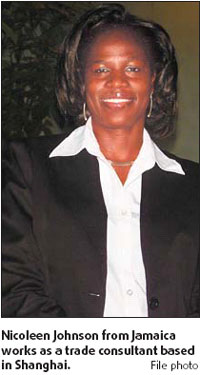| Home / Living in China / What's New | Tools: Save | Print | E-mail | Most Read |
| Nicoleen's Adventures Are Heaven Sent |
| Adjust font size: |
Unable to decide, she sought out a higher authority. "I am a Christian and I prayed about it and I started believing God wanted me to go to "So many (Jamaican) people have degrees from At the end of her Master's, Johnson earned a distinction as "most outstanding" international student in the graduate program at Fudan and was recommended by a faculty member for a scholarship that led to a doctorate in international relations. Today, she's an independent trade consultant based in Her experience and insights into She estimates that about 100 Caribbean expats live in While There's a large ethnic Chinese population in The association is to serve mainly as a support network for members who plan to work closely with Caribbean embassies to boost the profile of the region in They also plan to donate funds to a charity and so far, they've raised over 6,000 yuan ($785) from a fundraising dinner in April that featured Caribbean cuisine and a speech by While it isn't a top priority, another goal is to help teach Chinese about the distinct people and cultures of the For Johnson, even after a decade in Saying she's from the home of Bob Marley, reggae music or attractive sandy beaches, usually don't cut it. She's learned to laugh about it. "When you tell them where you're from, they ask you where in The group hopes the presence of noted Caribbean athletes in next year's Beijing Olympics would boost the profile of the region within ( |
| Tools: Save | Print | E-mail | Most Read |
 |
| Related Stories |
|
